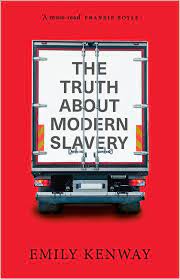Book review - Modern Slavery
When discussing those who make the hazardous journey by sea to Europe, a distinction is often made between “refugees” and “economic migrants”, in which the first category is seen as more deserving of help. And yet many “economic migrants” have been forced to seek a better life abroad because of climate change, political instability, corruption or extreme poverty. On arrival, it is often necessary to accept exploitative conditions in order to survive. This happens under our noses every day.
In The Truth About Modern Slavery, Emily Kenway suggests that we are being misled about the nature of the problem in the UK and abroad because of how “slavery” is framed. The new abolitionists’ condemnation of traffickers has become “a cover for anti-migrant policies and harder borders”. By focusing on trafficking as “a problem of crime and migration”, some cast the migrant as a social “aberration” who “we simply need to arrest, deport and eradicate”. The “hostile environment”, created in 2012 by the then home secretary, Theresa May, “not only pushes undocumented people into riskier parts of our economy but also prevents them from seeking help safely when they experience exploitation”.
A similar theme is taken up by Hsiao-Hung Pai in Ciao Ousmane: The hidden exploitation of Italy’s migrant workers, which explores that country’s mistreatment of Black African workers in the agricultural sector. As both authors demonstrate, vulnerable migrants and “undocumented workers” are being exploited by employers in wealthy European countries precisely because they have no rights. Their fear of deportation is systematically abused. That they are working, Kenway says, displays “an appetite for their labour that matches their wish to be here”.
Criss-crossing between the farming regions of southern
Italy, Pai follows the fortunes of several transient workers. Her narrative is
occasionally repetitive – endless evictions, dawn starts, long days toiling,
the search for accommodation, the racism – but much here needs repeating.
Italy’s punishing harvests have been documented before – the book’s title
refers to Ousmane Diallo, a Senegalese olive harvester who died in 2013 when a gas
canister exploded in a Sicilian field – but, as Pai points out, it takes a
worker’s death for “extreme exploitation to come to the surface” and “after a
short while in the media spotlight, it [is] submerged again”.
Pai details how migrants are treated by farmers in Sicily who want cheap labour (an average day’s pay is around €25) but don’t want to provide workers with suitable accommodation. Some have the audacity to charge workers to stay in outhouses lacking basic facilities or a roof. Mostly, workers end up squatting in camps without amenities, ruins or disused buildings. They are further exploited by the mafia-controlled caporali, who “arrange” the work, take a cut and sometimes run off with the workers’ earnings. Migrant workers are often forced to buy residence permits, in return for fake employment contracts. The farmers claim they are paying a fixed wage and benefit twice over, short-changing the worker and the tax office. The figures Pai notes are breathtaking: “When Mohammed picked twenty-five crates of olives and earned only €75, his employer would make €937.50”.
Pai explores the failure of the authorities to deal in an orderly and humane way with the plight of these essential agri-workers and condemns the corrupt officials who run shelters for their own profit as well as the politicians who make things worse with racist rhetoric and policies. Matteo Salvini, for example, Deputy Prime Minister of Italy and Minister of the Interior from June 2018 to September 2019, predictably blamed the conditions in the camps on those who had the misfortune to live there. Pai emphasizes the racism of local people, who refuse to rent rooms to Black workers and documents vicious attacks against African boys on bicycles: “When vehicles hit them, usually in the dark, they would turn off the car lights so that no one could see their number plates”.
Originally published by the TLS

